|
The Catholic
University of America |

|
 TRS
220
The
Church Through the Ages: From St. Paul to Luther TRS
220
The
Church Through the Ages: From St. Paul to Luther
Aquinas Hall 102, M-W 3:10-4:25 P.M. |
Bulletin Board
The Class of 2009
|
|
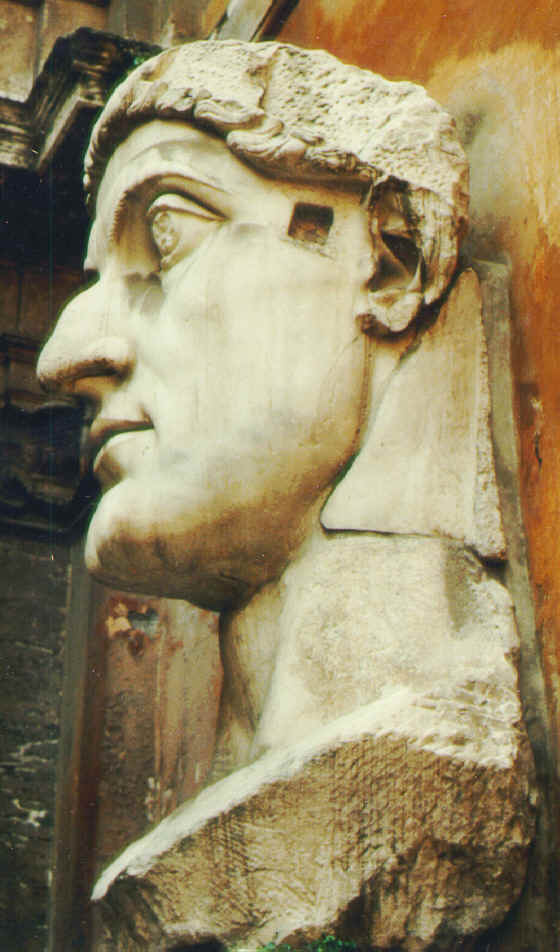 |
This
course will examine the history of the Christian church from the
Apostolic Age to the beginning of the Protestant Reformation. For
more information about the contents of
the course
Click here |
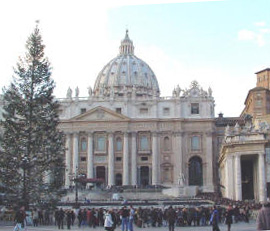 - -
St
Peters, Rome at Christmas |
|
Emperor Constantine
The First Christian Roman Emperor |
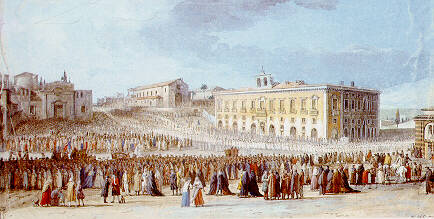
Religious
Procession in Catania, Sicily ca. 1800 |
|
|
Ken Pennington
Offices:
326-328
Caldwell Hall
Tel. 319-6264
416 Law School
Tel. 319-5150
|
Office Hours -
Fall 2009:
M-W
11:30-12:30 (326-328 Caldwell)
M-W
1:30-2:30 (416 Law)
M
7:00-8:00 PM (416 Law)
and by appointment
 Pennington@cua.edu Pennington@cua.edu
Kenneth.pennington3@verizon.net
(Click on addresses to send
Email)
Home tel.: 202-547-3620 |
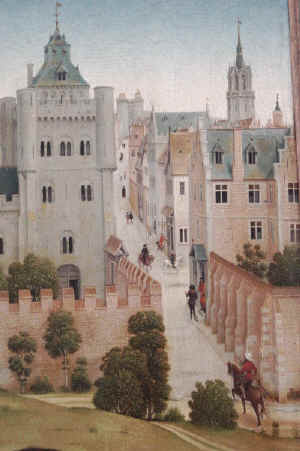
Rogier van der Weyden, Bladelin Altar
(detail) |
Any interest in what Professor Pennington does outside of TRS
220? Click here
|
Graduate Assistants |
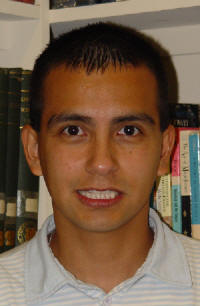
Samuel Vasquez
Office: Caldwell 326-328
Office Hours: W 1:00-2:00 PM
To email
Click here |
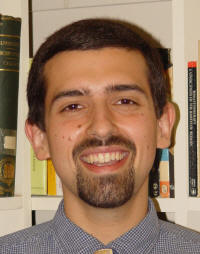
Jacob Wood
Office: Caldwell 326-328
Office Hours: M 2:00-3:00 PM
To email
Click here |
Topics and materials for TRS 220
| The digitized maps in the Topics are taken from a
variety of sources. Two atlases have been particularly useful:
The Harper Atlas of World History (Harper-Collins) and The Times
(of London) Atlas of World History (Hammond). You can consult
both volumes in Mullen Library. |
|
Topic 1
The Apostolic Church
and the Roman Empire |
Topic 2
Conversion of Northern Europe |
Topic 3
Christianity in the Eastern
Mediterranean and the Rise of Islam |
Topic 4
Charlemagne and
the Vikings |
Topic 5
The Gregorian Reform and the First
Crusade |
Topic 6
The Church in the Twelfth Century
and the Rise of the Papacy
|
Topic 7
Gothic
Architecture
and Music |
|
Topic 8
Papacy in Avignon, The Great
Schism, Conciliarism |
Topic 9
Religion in the Renaissance
Art, Society, and Religious
Mentalité of the Renaissance |
Topic
10
Postscript to the Medieval Church (Time
permitting)
|
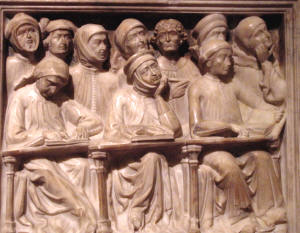 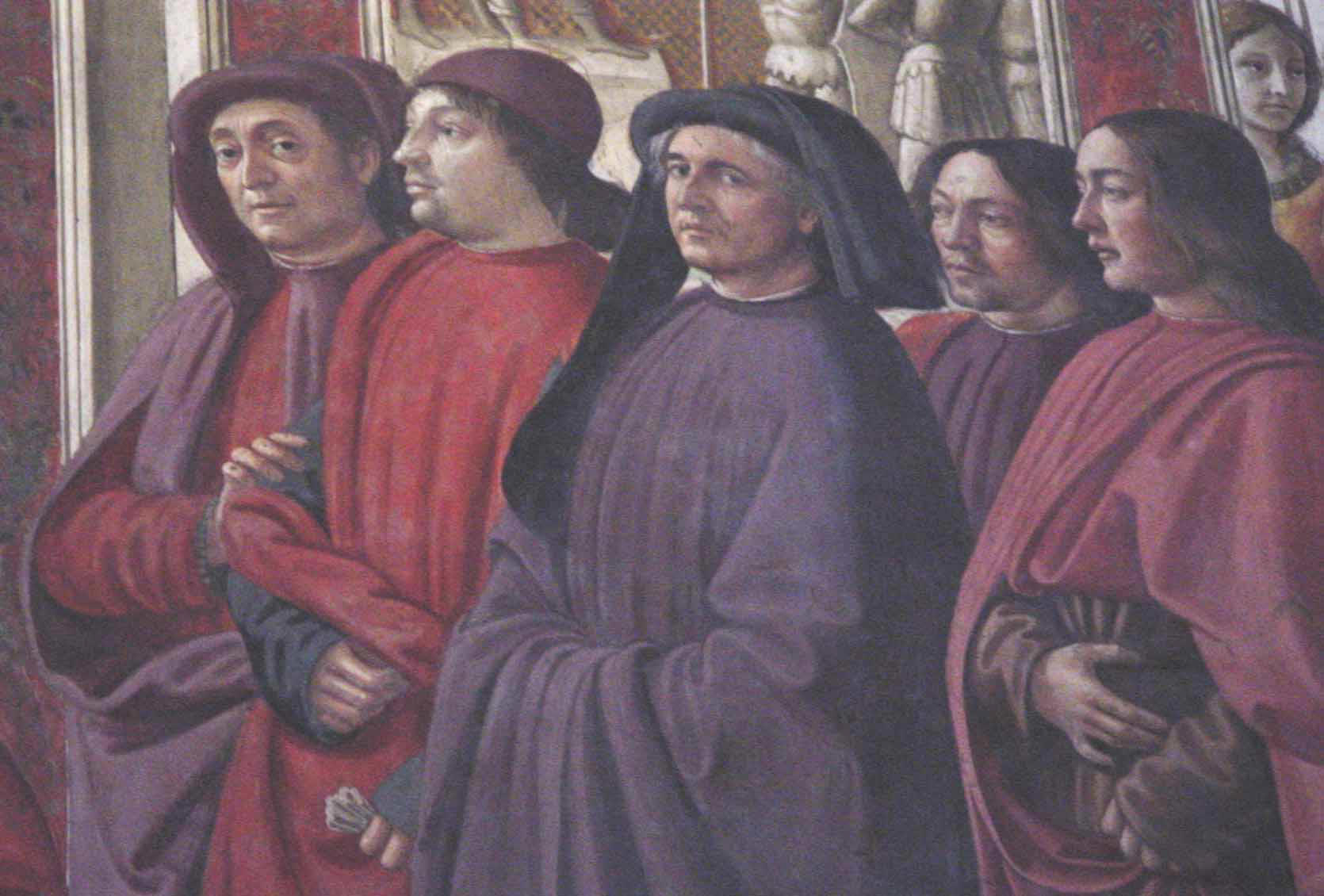 |
Required Text:
F. Donald Logan, The
History of the Church in the Middle Ages (London-New York:
Routledge, 2002) ISBN 0-415-13289-4
This text may be bought at the CUA Bookstore or ordered
from Amazon.com
or Barnes and
Noble for $26.82
at Amazon (no tax, free
shipping) and Barnes and Noble for $28.12 plus
tax (that's a no brainer). |
Topics
The
course meets twice a week: Lectures on
the topics of the course each Monday and Wednesday in
the Aquinas Hall 102
This Homepage for TRS 220 will provide internet links that you
will find useful for the course. You will be informed by Email when links or
material are added to the Homepage that you should consult. There will be other
links on the Homepage that will not be part of the course requirements but that
will expand your horizons!
Email Requirement

Each student will be assigned a mentor, either
Sammuel or Jacob. You must send an Email message to
either Sammuel or Jacob by Friday,
September 11th. After that date, we ask you to contact your mentor with
any questions or comments that you have about the course. They can be very
helpful to you for achieving success in the class. Further,
each student must write to Professor Pennington at the
beginning of the semester (deadline for sending your email to Professor
Pennington is September 11th. The message to Professor Pennington
should tell him about your interests and background.
An important reason for these emails is to build a listserve for the class with
which we will keep you informed, so send your email through
your preferred email server.
Feel free to email Professor Pennington
more than once if you wish. You may ask him questions about the
materials of the course, send him comments on the course, tell him how much you
enjoy Washington's great museums, or anything else that strikes your
fancy.
Schedule of Topics for Fall 2009
Audio recordings of the lectures are linked to each
date. Click on the link
|
September 2-(No
class on September 7, Labor Day)-Sept.
9- Sept. 14 (Sorry, no audio lecture
for Sept. 14)-Sept.
16:
The Apostolic Church, Spread of Christianity in the Mediterranean, The
Christian Roman Empire
Readings: Logan, Chapter 1 |
|
Topic Web Page 1 |
|
Sept. 21(Quiz):
The Conversion of Northern Europe: Franks, Irish,
Scandinavians, Slavs and Germans
Readings: Logan, Chapters 2 and 4 |
|
Topic Web Page 2 |
|
Oct. 5
(Quiz)
- Oct. 7: The Vikings, the Gregorian
Reform and the First Crusade
Readings: Logan, Chapters 6 and 7 |
|
Topic Web Page 5 |
Oct. 12:
Columbus
Day:
Monday October 13th No Class
October 14:
Review for Midterm
Midterm Examination
Questions
October 19: Midterm
Examination
| Nov. 23: A New
Christian Architecture Shapes European Cities
Readings: Logan, Chapter 12 |
|
Topic Web
Page 7 |
|
Nov. 30: The Papacy in Avignon, The Great
Schism, Conciliarism
Readings: Logan, Chapters 14, 15,
16, 17 |
|
Topic Web Page 8 |
 Nov. 25: Thanksgiving Vacation:
No Class
Nov. 25: Thanksgiving Vacation:
No Class |
|
Dec. 2 -
Dec.7 -
Dec. 9
(Quiz):
The Papacy in Avignon, The Great Schism, Conciliarism
Dec. 14:
Art, Society, Religious Mentalité of the Renaissance,
The Building of Saint Peter's Basilica
Visual Materials: On the Class Web Site |
|
Topic Web Page 9 |
| Postscript to the
Medieval Church: The Spread of Christianity beyond the Borders of
Christendom, Luther and the Protestant Revolt,
The Reform of the Catholic Church |
|
Topic Web Page 10
|

Examinations
and Quizzes
There will be five quizzes during the
semester. They will be an identification for which you must write a
paragraph describing the IMPORTANCE of the person, place or thing.
The examinations will be essays with
four identifications and one illustration taken
from the visual materials on the Website.
Final
examination will be on Wednesday,
Dec. 16th from 4:00-6:00 PM in Aquinas 102.
(Click here to see
Final Examination
Questions)
Grading
The grades for the course will be
calculated on the basis of five quizzes (one quiz with the lowest grade will be
dropped) (20%), mid-term essay examination (30%) and final essay examination
(50%). There is an opportunity for extra-credit work that would add points
to either your mid-term or your final examinations. For more information
click here.
Attendance
There is a marked relationship between
attendance and performance in a class. For that reason there is a strict
attendance policy in this class. More than three absences during the
semester will result in an automatic lowering of your final grade by one step
(i.e. A to A-). Excused absences will not count. You may receive an
excused absence by emailing Professor Pennington before the beginning of the
class. Attendance will be taken during the last 15 minutes of the class.
Other matters
If a student has a disability for which special
consideration during examinations is necessary, please contact the instructors
during their office hours.
Advice on avoiding plagiarism.
Plagiarism is the worst academic sin that a person can commit. Students
can destroy their futures and professors can lose their tenure if they fall into
the plagiarist pit. CUA's writing program has a good webpage that
discusses the issue and, most importantly, rules for avoiding it.
Click here for the
webpage.
If you encounter any academic difficulties in this course, please contact
the instructors immediately. We can be sympathetic and helpful!








